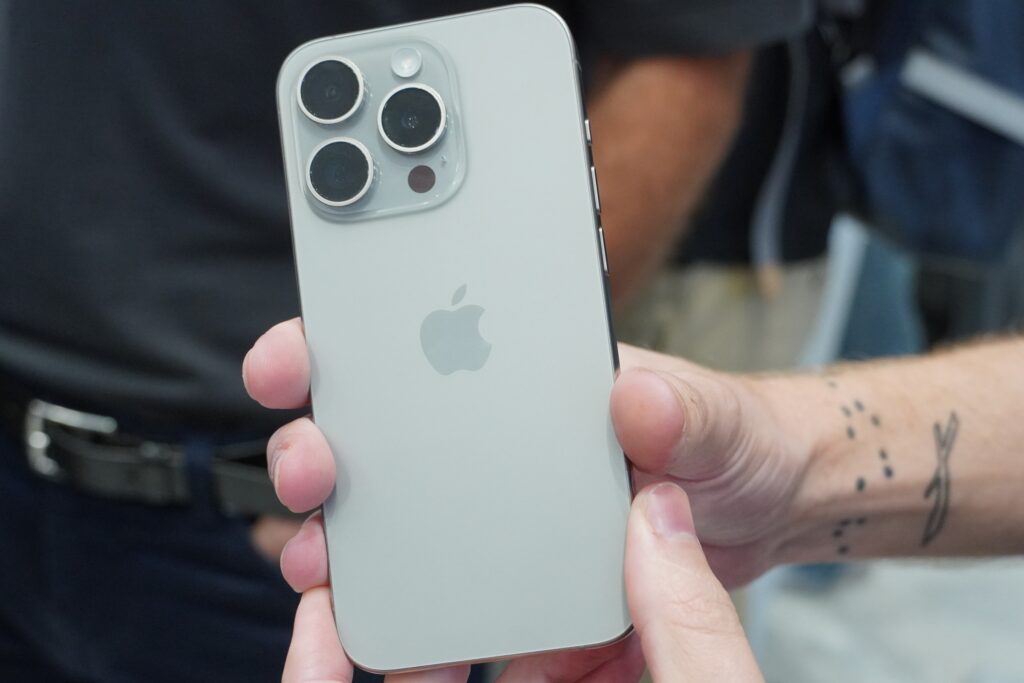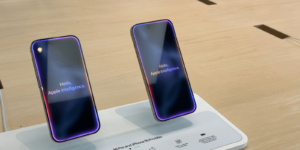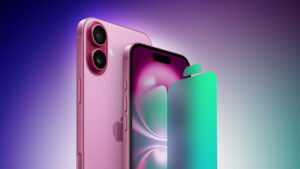iPhone comparison chart: Every iPhone compared

Picking out an iPhone used to be easier—just get the newest one with all the storage you can afford. We still recommend buying as much storage as you can afford, but the choice of which iPhone isn’t quite so simple. Apple currently sells nine iPhone models, four of which launched in fall 2024, two in fall 2023, two in fall 2022, and one in spring 2022. Plus you can still buy older refurbished models from the Apple Refurbished Store and elsewhere. Apple offers all this choice because, quite simply, different people have different priorities.
Apple’s latest iPhone lineup includes the iPhone 16, iPhone 16 Plus, iPhone 16 Pro and iPhone 16 Pro Max, which it sells alongside the iPhone 15, iPhone 15 Plus, iPhone 14, iPhone 14 Plus, and iPhone SE (3rd gen). The best iPhone depends on your own personal preferences, so it’s not necessarily the case that the number one iPhone is the one you should buy. This group test of all the iPhones Apple sells should give you a good idea of which iPhone will suit you, and whether you can save money or if it would be worth spending more.
For more help choosing the iPhone for you read our Buying Guide where we explain how each iPhone is different in terms of price, specs and features, cameras, screens, and durability. See: Which iPhone should I get?
Want to buy a new iPhone 16? Don’t pay more than you need to! We have also collected the best deals for the iPhone 16-series in the U.K. and the best deals for the iPhone 16-series in the U.S. in separate articles.
iPhone specs compared
Apple sells four current-generation model iPhones: the iPhone 16, 16 Plus, 16 Pro and 16 Pro Max. You can also buy the iPhone 15, 15 Plus, iPhone 14, iPhone 14 Plus and iPhone SE (3rd gen). Here’s how their most important specs compare, but remember, specs aren’t everything! We’ve put these in price order, so scroll across to find the phone you are after.
iPhone SE (3)iPhone 14iPhone 14 PlusiPhone 15iPhone 15 PlusiPhone 16iPhone 16 PlusiPhone 16 ProiPhone 16 Pro MaxCurrent price$429/£429$599/£599$699/£699$699/£699$799/£799$799/£799$899/£899$999/£999$1,199/£1,199Screen size4.7″6.1″6.7″6.1″6.7″6.1″6.7″6.3″6.9″Size (H x W x D)5.45″ x 2.65″ x 0.29″5.78″ x 2.82″ x 0.31″6.33″ x 3.07″ x 0.31″5.81″ x 2.82″ x 0.31″6.33″ x 3.06″ x 0.31″5.81″ x 2.82″ x 0.31″6.33″ x 3.06″ x 0.31″5.89″ x 2.81″ x 0.32″6.42″ x 3.06″ x 0.32″Weight5.09 oz6.07 oz7.16 oz6.02 oz7.09 oz6oz7.03 oz7.03 oz7.99 ozColorsStarlight, midnight, redBlue, purple, midnight, starlight, redBlue, purple, midnight, starlight, redPink, yellow, green, blue, blackPink, yellow, green, blue, blackUltramarine, teal, pink, white, blackUltramarine, teal, pink, white, blackDesert, natural, white, blackDesert, natural, white, blackDisplayLCD (1334×750-pixel at 326 ppi)OLED with HDR (2532×1170-pixel at 460 ppi)OLED with HDR (2778×1284-pixel at 458 ppi)OLED with HDR (2556×1179-pixel at 460 ppi)
2000 nits peak brightness (outdoor)OLED with HDR
(2796×1290-pixel at 460 ppi)
2000 nits peak brightness (outdoor)OLED with HDR (2556×1179-pixels at 460 ppi)
2000 nits peak brightness (outdoor), 1 nit minimum brightnessOLED with HDR
(2796×1290-pixels at 460 ppi)
2000 nits peak brightness (outdoor), 1 nit minimum brightnessOLED with HDR (2622×1206-pixel at 460 ppi), ProMotion 120Hz
2000 nits peak brightness (outdoor), 1 nit minimum brightnessOLED with HDR (2868×1320-pixels at 460 ppi), ProMotion, 120Hz
2000 nits peak brightness (outdoor), 1 nit minimum brightnessProcessorA15 Bionic (4-core GPU)A15 Bionic (5-core GPU)A15 Bionic (5-core GPU)A16 Bionic (5-core GPU)A16 Bionic (5-core GPU)A18 (5-core GPU)A18 (5-core GPU)A18 Pro (6-core GPU)A18 Pro (6-core GPU)Storage64/128/256GB128/256/512GB128/256/512GB128/256/512GB128/256/512GB128/256/512GB128/256/512GB128/256/512GB/1TB256/512GB/1TBAuthenticationTouch IDFace IDFace IDFace IDFace IDFace IDFace IDFace IDFace IDRear Camera12MP f/1.8 Wide camera, 0.5, 1x zoom12MP f/1.5 Wide camera,
12MP f/2.4 Ultra Wide camera, 0.5, 1x zoom12MP f/1.5 Wide camera,
12MP f/2.4 Ultra Wide camera, 0.5, 1x zoom48MP f/1.6 Wide camera,
12MP f/2.4 Ultra Wide camera, 2x zoom48MP f/1.6 Wide camera,
12MP f/2.4 Ultra Wide camera, 2x zoomCamera Control ‘button’,
48MP f/1.6 Fusion, 12MP f/2.6 Ultra Wide; 0.5X, 1X, and 2X zoom; Macro, Spatial CaptureCamera Control ‘button’,
48MP f/1.6 Fusion, 12MP f/2.6 Ultra Wide; 0.5X, 1X, and 2X zoom; Macro, Spatial CaptureCamera Control ‘button’, 48MP f/1.78 Fusion, 48MP f/2.2 Ultra Wide, and f/2.8 12MP Telephoto; 0.5X, 1X, 2X and 5X zoom; Macro, Spatial CaptureCamera Control ‘button’, 48MP f/1.78 Fusion, 48MP f/2.2 Ultra Wide, and f/2.8 12MP Telephoto; 0.5X, 1X, 2X and 5X zoom; Macro, Spatial CaptureFront Camera7MP f/2.2 camera, 1080p12MP f/1.9 camera, 4K HDR12MP f/1.9 camera, 4K HDR12MP TrueDepth, f/1.9, 4K HDR12MP TrueDepth, f/1.9, 4K HDR12MP TrueDepth, f/1.9, 4K HDR12MP TrueDepth, f/1.9, 4K HDR12MP TrueDepth, f/1.9, 4K HDR12MP TrueDepth, f/1.9, 4K HDRBattery capacity15 hrs video20 hrs video26 hrs video20 hrs video26 hrs video22 hrs video27 hrs video27 hrs video33 hrs video Wireless features5G (sub-6 only), Wi-Fi 6, Bluetooth 5.0,
NFC5G, Wi-Fi 6, Bluetooth 5.0,
NFC, Ultra Wideband5G, Wi-Fi 6, Bluetooth 5.0,
NFC, Ultra Wideband5G, Wi-Fi 6, Bluetooth 5.3,
NFC, 2nd-gen Ultra Wideband5G, Wi-Fi 6, Bluetooth 5.3,
NFC, 2nd-gen Ultra Wideband5G, Wi-Fi 7, Bluetooth 5.3,
NFC, 2nd-gen Ultra Wideband, Thread5G, Wi-Fi 7, Bluetooth 5.3,
NFC, 2nd-gen Ultra Wideband, Thread5G, Wi-Fi 7, Bluetooth 5.3,
NFC, 2nd-gen Ultra Wideband, Thread5G, Wi-Fi 7, Bluetooth 5.3,
NFC, 2nd-gen Ultra Wideband, ThreadPortLightningLightningLightningUSB-CUSB-CUSB-CUSB-CUSB-CUSB-CMagSafeNoYesYesYesYesYesYesYesYesAll the iPhones currently sold by Apple
1. Apple iPhone 16
Pros
A18 chip marls a leap of two chip generations
Catching up to the iPhone 16 Pro
Camera Control and Action buttons
Cons
Lacks the camera prowess of the Pro models
No Always-On Display
No Pro Motion
Price When Reviewed:
$799
The iPhone 16 is a big leap from the previous generation, in fact, the step is large enough that it is catching the Pro model up. Where the iPhone 15 brought only a few new features that the iPhone 14 lacked, in the iPhone 16 we have a new phone with a significantly better processor, the new Camera Capture and Action buttons, and improved battery life. The question is more about why you would want to buy the iPhone 16 Pro when you can get a decent phone for $200/£200 less.
The iPhone 16 has a new look thanks to a bold color palette and two new buttons on the right-hand side: the Action button and a Camera Capture button. The colors on offer are Ultramarine, Teal, Pink, White, Black, all darker shades than the previous generation. Color choices are a matter of personal preference, but we would suggest that choosing a new iPhone based on the color would be a bad idea as you will be keeping it in a case if you are sensible.
The Action button first arrived on the iPhone 15 Pro and Pro Max in 2023. It is a customizable button that gives quick access to various functions that you can choose, such as the flashlight (torch), activating Voice Memos, or accessibility features. The Camera Control button is a new feature of all four 2024 iPhones and lets users quickly access camera tools and use various gestures to adjust camera functions like exposure or depth of field. This camera button uses a Taptic Engine to simulate the feeling that it is being pressed, so you get a bit more feedback than the onscreen button.
However, the Camera Control button has its limitations: you won’t be able to use it while wearing gloves. This button is a good reason to choose the smaller iPhone models though, as it can be a bit of an uncomfortable stretch to use if you have small hands.
The cameras themselves get a boost in the iPhone 16 thanks to some innovations. The two-in-one ‘Fusion’ camera offers built in 2x telephoto functionality and features a new 48-megapixel sensor that offers better resolution and light intensity. The 12MP Ultra Wide camera has a larger aperture and bigger pixels than the previous generation. It can capture 2.6x more light and can now shoot close‑up macro photos or wider photos.
When it comes to video the iPhone 16 can shoot 4K/60fps, which is more than enough for most people. A new Audio Mix feature lets you adjust the way voices sound in your videos. You can decrease background sound, or just focus on the voices that are in frame, for example. There is also a new Spatial Capture feature, but that only really matters to those who own a Vision Pro.
Many of the new photo-related features are made possible by the A18 chip. This is a leap of two generations from the A16 that featured in the iPhone 15 (and the iPhone 14 Pro before that). Since 2022’s iPhone 14, Apple has given the standard iPhone the processor used by the Pro models in the preceding generation, but in 2024, rather than equip the iPhone 16 with the A17, the iPhone 16 has the same generation of processor as the iPhone 16 Pro, albeit with one fewer GPU chip and other behind-the-scenes differences.
The A18 is an impressive chip and our Geekbench results prove it. In the Geekbench 6 multi-processor test the iPhone 16 shows a significant 25% increase in performance from 6,242 points to 7,828 points. Performance jumps in the graphics benchmarks were even more pronounced.
Another improvement compared to the previous generation is the battery. The phones have been re-engineered to better dissipate heat and to make space for a larger battery, as a result, battery life extends to 22 hours on the iPhone 16, compared to 20 on the iPhone 15. If you want longer battery life, both the iPhone 16 Plus and iPhone 16 Pro can manage 27 hours, while the Pro Max boosts that to 33 hours.
Also read: Best iPhone 16 deals (US) and Best iPhone 16 deals (UK)
2. Apple iPhone 16 Pro Max
Pros
Biggest screen on an iPhone
More battery life than you might need
Cons
Camera Control button could be uncomfortable to use with small hands
Price When Reviewed:
$1,199
If it’s a huge iPhone you want then the iPhone 16 Pro Max has the biggest screen on an iPhone ever. Like the iPhone 16 Pro, Apple’s upped the screen size for this generation, so the iPhone 16 Pro Max now boasts a 6.9-inch screen, up from 6.7 inches. The larger screen is made possible by reduced bezels, so the dimensions aren’t much bigger than the previous generation and it is a similar size to the iPhone 16 Plus. It’s about 30g heavier than the iPhone 16 Plus and iPhone 16 Pro though.
Other than that there is little to separate the iPhone 16 Pro and the iPhone 16 Pro Max, so all the details in the iPhone 16 Pro section (below) apply here too. This year the cameras in both the pro iPhones are identical, so that is no longer a reason to go Max.
What stands out most about the iPhone 16 Pro Max is the battery life, which, according to Apple is up to 33 hours compared to 27 hours for the iPhone 16 Pro and iPhone 16 Plus. Those are Apple’s battery claims and depend on what you are using the iPhone for. But six extra hours of battery life should be significant. That said, does battery life beyond the length of a typical waking day really matter? In theory, it could get you through most of a second day if you didn’t have access to a charger the night before.
If you like a large phone and you want all the camera features the iPhone 16 Pro Max will more than satisfy, although if you have the iPhone 15 Pro Max you could just wait another generation for the iPhone 17 Pro Max without missing out on too much.
3. Apple iPhone 16 Pro
Pros
Same camera as the iPhone 16 Pro Max
Improved battery life
Cinematic Slo-mo for video
Cons
Color choices are getting a bit boring
Price When Reviewed:
$999
The gap may have closed somewhat between the iPhone 16 and iPhone 16 Pro, but there are still plenty of features only offered by the iPhone 16 Pro that may well entice you, and some significant generational updates worthy of consideration.
First up, perhaps the most obvious difference (other than the new Camera Control button which is a feature of all the new iPhones for 2024) is the larger screen. It is no longer the case that the iPhone 16 and 16 Pro share the same screen size, now the iPhone 16 Pro features a 6.3-inch display, up from 6.1 inches. The phone itself is only fractionally bigger than the iPhone 16, the larger screen is made possible by reduced bezels. It weighs a fair bit more than the junior handset though, at 199 games (7.03 ounces) rather than 170 grams (6.00 ounces). Only the Pro models get the Always-On display and ProMotion (120hz) refresh rate introduced a couple of generations ago.
The other thing setting the pro and standard iPhones apart is the color choices. Traditionally Apple positions the standard iPhone as more consumer-friendly, with fun bold color choices. The Pro models get more businesslike micro-blasted metallic finishes. The 2024 iPhone 16 Pro color options aren’t a lot different from the iPhone 15 Pro color options. The new entry is Desert Titanium, replacing Blue Titanium as an option. Desert Titanium is a nice shade that fluctuates between bronze and a subtle rose gold depending on the light. At the end of the day, the color doesn’t really matter because you are going to put it in a case to protect it despite Apple’s claims that all the 2024 iPhones are protected by next-generation Ceramic Shield technology that makes it two times tougher than any smartphone glass.
Externally not so Mac has changed, but on the inside it’s a different story. There are internal design improvements including changes to the aluminum thermal substructure and back glass optimizations that further dissipate heat and enable up to 20 percent better sustained performance than 15 Pro, according to Apple.
The A18 Pro chip in the iPhone 16 Pro and Pro Max is superior to the A18 in the iPhone 16 and 16 Plus. In our Geekbench tests, the iPhone 16 Pro Max scored 8,146 compared to 7,828 in the iPhone 16. There is also two times faster hardware-accelerated ray tracing in the A18 Pro that will enhance games. In practice, you are unlikely to benefit from the computing power of the A18 Pro, unless you shoot professional films or play games like “Resident Evil Village” on the best possible graphics settings. But that has always been the case with Pro models.
Speaking of photography, this is an area where the iPhone 16 Pro and Max stand out from the iPhone 16 and Plus. There have been times in the past the the Pro Max would have a superior camera, but this year the iPhone 16 Pro gets the same camera as the 16 Pro Max.
As is traditional, the Pro model has a three-lens array on the rear module while the iPhone 16 has two lenses on the back. For 2024, there is a new 48MP Fusion camera with second-generation quad-pixel sensor. The rear camera is made up of the 48MP f/1.78 Fusion, 48Mp f/2.2 Ultra Wide, and 12Mp f/2.8 Telephoto lenses. The latter lens now brings 5x optical zoom capabilities to the Pro. Previously the 5x optical zoom was only a feature of the iPhone 15 Pro Max.
There’s also a new 48MP Ultra Wide camera with a more advanced quad-pixel sensor for high-resolution 48MP ProRAW and HEIF photos. Macro photography has been a feature of the Pro iPhones for some time, but now that it is available on the iPhone 16 Apple needs to offer something more on the pros, which is 48MP macro photos. There is also new second-generation sensor-shift optical image stabilization on the pro models.
The new 48MP Fusion camera brings Cinematic Slo-mo to the pro iPhones by enabling 4K 120 fps Dolby Vision, that is up from 4K/60fps on the iPhone 15 Pro. There’s now what Apple calls a studio-quality four-mic array for capturing audio and you can also remix the audio to remove or change the prominence of audio elements like off-screen talking.
These camera features are impressive, but they may only be important for photography professionals and those wanting to start a film career.
4. Apple iPhone 16 Plus
Pros
Camera Control and Action buttons
Cons
Camera Control button could be uncomfortable to use with small hands
Screen isn’t as big as the iPhone 16 Pro Max
No Always-On Display
No Pro Motion
Price When Reviewed:
$899
The iPhone 16 Plus is essentially a bigger version of the iPhone 16. It features the same camera and processor. Everything we mention in the iPhone 16 section applies here too. However, there are both benefits and disadvantages to the larger form factor.
One key benefit is that the iPhone 16 Plus offers better battery life than the smaller iPhone 16. Like the iPhone 16 Pro, the iPhone 16 Plus can offer 27 hours, according to Apple’s tests, while the iPhone 16 is limited to 22 hours. It’s one hour more than the iPhone 15 Plus’s 26 hours. Still a long way behind the iPhone 16 Pro Max with 33 hours, though.
This is one reason why the iPhone 16 Pro Max could be considered a more worthy purchase: if you want a big phone with the best battery life the Pro Max model is further ahead than the iPhone 16 Plus.
Other than battery life, the differences between the iPhone 16 Plus and the iPhone 16 Pro Max are (like the differences between the iPhone 16 and 16 Pro) less pronounced than usual. There is a smaller gap between processors in the pro and standard models than there has been in a couple of years, and the whole iPhone 16 series shares the Camera Control and Action buttons.
As mentioned in the iPhone 16 section, the Camera Control button may be a bit of a stretch to use comfortably on the iPhone 16 Plus if you have small hands. If you have small hands the Plus probably isn’t going to be that comfortable to hold anyway. If you are lucky enough not to be disadvantaged by hand size, the big screen is a good reason to choose the Plus size over the smaller iPhone. But if it’s a really big screen you want then you might want to consider the even-bigger iPhone 16 Pro Max.
Like the iPhone 16, the iPhone 16 Pro, is significantly better than the previous generation, but where we’d suggest that the differences between the iPhone 16 and 16 Pro are less pronounced, the differences between the iPhone 16 Plus and Pro Max are more significant.
5. Apple iPhone 15
Pros
Much better camera than iPhone 14
Dynamic Island
Cons
No Always-On Display
No Pro Motion
No Apple Intelligence
Price When Reviewed:
From $699 (Was $799)
While the standard iPhone 15 model didn’t get all the bells and whistles of 2023’s Pro models, it did offer some great new features in comparison to 2022’s iPhone 14.
First up is the Dynamic Island, the breakthrough feature of the iPhone 14 Pro and Max that transforms the notch into something a little more useful. The iPhone 15 doesn’t get the other features of the iPhone 14 Pro though: there’s no ProMotion and no Always-On display, for example.
The camera for the iPhone 15 is also better than the predecessor’s. It gains a dual-lens rear camera with 48MP f/1.6 Main, 12MP f/2.4 Ultra Wide; and up to 2X optical zoom. That’s compared to the 12MP Main with ƒ/1.5 aperture in the iPhone 14. Like all the 2023 iPhones it also gains Smart HDR 5.
This generation’s colors: black, blue, green, yellow, and pink are a bit more muted than the bolder blue, purple, yellow, midnight, starlight, and Product Red of 2022. Compared to the bright color options of the iPhone 16 they look like pastel shades. We prefer them.
Where the iPhone 15 Pro models are smaller, due to reduced bezels, the iPhone 15 is actually a tiny bit taller than the iPhone 14 at 5.81in (147.6cm) compared to 5,78in (146.7mm). It also weighs a fraction more than the predecessor did. The iPhone 15 and iPhone 16 share the same dimensions.
All the 2023 iPhones offer a USB-C port where the Lightning port once was. The USB-C port on the Pro models offers some more pro features though, for example, the USB-C on the iPhone 15 supports USB 2 while the same port on the iPhone 15 Pro (and 16 Pro) supports USB 3 up to 10GB/s.
The iPhone 15 gets the processor of the iPhone 14 Pro, the A16 Bionic. It has a 6-core CPU and a 5-core GPU and should offer a nice boost compared to that in the iPhone 14.
Also read: Best iPhone 15 deals (US) and Best iPhone 15 deals (UK).
Read our full
Apple iPhone 15 review
6. Apple iPhone 15 Plus – Get a big iPhone for less
Pros
Lower price
Dynamic Island
Cons
No always-on display
No Pro Motion
No Apple Intelligence
Price When Reviewed:
$799 (was $899)
The iPhone 15 Plus is essentially a larger version of the iPhone 15 and it shares the same features, including the USB-C port and A16 Bionic chip with 6-core CPU and 5-core GPU).
It has a 6.7-inch display like the iPhone 15 Pro Max, but is actually slightly larger than the pro variant. Despite this, it’s lighter than the Pro Max at 7.09oz rather than 7.81oz, and is also lighter than the 2022 Plus model was.
The Pro Max is the superior phone with its “tetra prism” periscope lens, 5x zoom, and other features, but the iPhone 15 Plus does at least get an improved camera compared to the previous generation, with a new 48MP main camera with a ƒ/1.6 aperture compared to the 14 Plus’s 12MP, ƒ/1.5 aperture. It also offers Smart HDR 5.
Like the iPhone 15, the Plus gets the Dynamic Island, which transforms the notch into something a little more useful. You won’t find the other features of the iPhone 14 Pro though: there’s no ProMotion and no Always-On display.
The price is better for 2023. The iPhone 14 Plus started at $929 / £949 but the iPhone 15 Plus will start at $899/£899.
Read our full
Apple iPhone 15 Plus review
7. iPhone 14
Pros
Lower price
Cons
No Dynamic Island
No always-on display
No Pro Motion
No Apple Intelligence
Price When Reviewed:
£599 (was £699)
Rather than upgrading the processor to the A16 Bionic, as seen in the iPhone 14 Pro (and Max), the iPhone 14 (and Plus) instead features the A15 Bionic, albeit the variant from the iPhone 13 Pro. This was the first time Apple gave the standard iPhone the pro iPhone’s hand-me-downs–it did the same with the iPhone 15. The iPhone 16 gets a brand-new chip though.
The iPhone 14 was very similar to the iPhone 13, but offered some camera improvements including a faster aperture (ƒ/1.5 rather than ƒ/1.6) and a larger sensor on the main camera to bring better overall performance and improvements in low-light shooting. The iPhone 14 also benefits from the Photonic Engine computational system that helps capture more detail in challenging light and aids features such as Foreground Blur.
The Action Mode was another bonus feature that made the iPhone 14 a better phone than the iPhone 13. Action Mode means you can video while walking, or even running and get a steady result. It’s a fun feature that people will probably take advantage of. The selfie camera on the front is also improved on the iPhone 14, with a bigger aperture and autofocus.
There are other features that the iPhone 14 offers and the iPhone 13 lacked, such as the Crash Detection feature. If you are in such a situation then you’ll probably be glad to have the 14.
As for how the iPhone 14 compares to the iPhone 15, which also costs just $100/£100 more, the newer iPhone offers a lot for that extra money, including a superior 48MP camera, USB-C port, Dynamic Island, and the A16 Bionic chip. For another $200/£200 you could get the much more superior iPhone 16 though, which offers Apple Intelligence features.
Also read: Best iPhone 14 deals.
Read our full
Apple iPhone 14 review
8. iPhone 14 Plus
Pros
Large format at a lower price
Cons
No Dynamic Island
No always-on display
No Pro Motion
No Apple IntelligenceNo always-on display
Price When Reviewed:
£699 (was £799)
When it was introduced as a brand new model in 2022, the iPhone 14 Plus rocked the boat a bit because it meant that people who might have chosen the iPhone 14 Pro Max, because they wanted a big iPhone, now had a choice. They could save a decent amount of money and purchase a new iPhone with standard features. Or, to look at it another way, they could save money and get more storage by choosing a 512GB iPhone 14 Plus over a 256GB iPhone 14 Pro Max. For some, more storage will trump additional Pro features.
Now Apple has dropped the price of the iPhone 14 Plus to $699/£699 from its original $929/£949, so it’s good price if you want a big phone and don’t mind that it’s an older model.
Read our full
Apple iPhone 14 Plus review
9. Apple iPhone SE (2022) – The smallest iPhone and it has a Home button
Pros
Home button
Cheapest iPhone
Small
Cons
Old, mediocre quality cameras
Dated display with huge bezels
No mmWave support
Disappointing battery life
Price When Reviewed:
$429 (64GB) | $479 (128GB) | $579 (256GB)
The second generation iPhone SE (introduced in 2022) is the smallest iPhone sold by Apple. It’s a similar size to what the iPhone 8 was, so if that’s the iPhone size that’s right for you then this is the iPhone to consider – although we’d suggest an iPhone with a 6.1-inch screen (the iPhone 14, 15 or 16) would be preferable (the screen is larger, but the iPhone isn’t a lot bigger).
However, there’s one other important reason why for some people the iPhone SE is a good choice. Anyone who feels that they need the Home button will probably feel lost with any iPhone other than the iPhone SE. While most of us can adjust to Face ID and swiping rather than pressing a button, some benefit from the accessibility of a physical button, and there is no doubt that is the reason why Apple still sells an iPhone with a button (although we don’t know for how much longer that will be the case). There is a way to add a software Home button to any iPhone though. Read: How to add a software Home button.
The other reason to choose the 2022 iPhone SE is that it is Apple’s cheapest iPhone you can buy new. It now costs $429/£429. Although that is more than the older generations cost: the 2020 iPhone SE cost $399.
While we don’t really recommend buying the iPhone SE, if you need that Home button–and we know some older folk who are concerned about not having that button–it’s the only available option. If you are looking for an iPhone for an elderly relative, this might be the one, see: Best iPhone for seniors.
Also read: Best iPhone SE deals.
Read our full
Apple iPhone SE (2022) review
That’s the low down on every iPhone Apple sells as of the end of 2024. Also read our Best iPhone Deals to get a good price on all iPhones at stockists near you.




